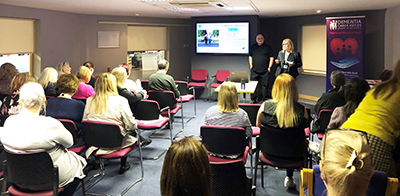Glasgow’s care services staff pledge to make a difference to people living with dementia and their carers
Care Services staff within Glasgow’s Health and Social Care Partnership will, this week, take part in specific engagement sessions to help them understand and acknowledge the contribution they make to people affected by dementia.
The series of talks, given by Tommy Whitelaw from the Health and Social Care Alliance, will be delivered to staff who care for and provide services to more than 10,000 service users across the city, many of whom have the condition.
Research suggests that there is around 8,000 people with varying stages of dementia in Glasgow and each year around 800 people receive a diagnosis.
Tommy travels the length and breadth of the country as part of the You Can Make a Difference campaign, working to raise promote the importance of kindness, empathy and patience when supporting people living with dementia and their carers.
He encourages health and social care professionals to reflect on the importance of their role in caring for people with dementia and urges them to think about how, having time to reflect on their own past experiences and interactions, they can make a difference to the lives of those affected by the condition.
Tommy, cared for his late mother with the condition and uses both his own experiences and recounts those of other people, from family carers to social care and health professionals, as part of the sessions. In his powerful talk, he describes in his own words about their daily struggles and how the compassion and understanding of a district nurse helped him and his mother through their darkest days.
Each talk will be adapted to fit each particular audience, whether they interact directly with service users and their families or carers, or indirectly. This includes home carers, overnight home carers, carers responding to community alarms, call handling staff, assessors, managers, technicians, coordinators and support staff.
The session asks different groups of staff to consider what matters to people, rather than what’s the matter with the people. Tommy then asks what, as an individual, will do now to make a difference and what support do you need in your workplace to make that difference.
Findings from the sessions will feed into an improvement plan and pledges will be recorded on the leaves of the ‘Dementia Tree’ to act as a visual reminder of our You Can Make a Difference campaign in care services.
Tommy said: “Good care is all about people and relationships. It’s about the compassion and understanding shown by the person who knocks on your door every day of the week.
I want to remind staff of the value in supporting people to live in their own homes, in their communities, for as long as they can and that only happens with good care.
Our talks are an ideal opportunity for health and social care staff to pause and reflect on what is really important to the people in their care. As our real life stories and case studies show, a small pledge can make a huge difference. I hope it can remind staff why they chose their profession and inspire them for the future.”
Following one of Tommy’s talks, Jackie Nixon, who’s worked in care services for 27 years, said; “Tommy’s presentation was a really moving and personal. He described stumbling through and feeling alone and isolated until they found the kindness and understanding, that they both needed. It’s such a hard subject to talk about caring for a loved one that can’t care for themselves.”
Ruben Wilson, a care services coordinator, echoed this saying; “I agree, I felt quite emotional listening to Tommy’s experience and the others he highlighted. Although we as individuals can take steps to listen to and support our clients and their carers, it is also about how we work with each other, as a team, to make a difference. Whether you are front line care givers in people’s homes or working in a supportive function we can all take something away from today.”

